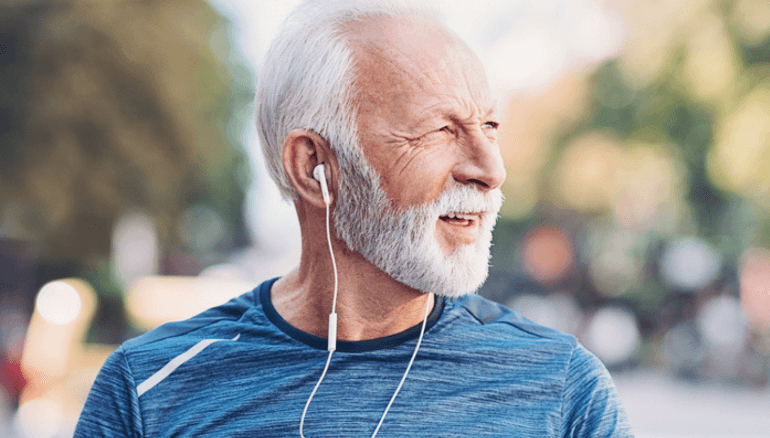All it takes is a surprise set of stairs to remind you that you might be a little out of shape. Maybe exercise fell off the to-do list with dwindling downtime or you struggled to regain a routine after injury. Maybe you’re overwhelmed by the options out there or you’re managing a chronic health condition and don’t know where to start safely.
Well, here’s the must-know on movement to make the most of the important health benefits it offers.
Exercise as medicine
The benefits of regular movement make for a lengthy list. It can have an immediate effect on your mood, energy, and sleep, helping you feel happier and healthier. The long-term payoffs include weight management, better mental health, stronger bones, muscles, and joints, and a reduced risk of heart attack, type 2 diabetes, and some cancers. Research consistently shows exercise can help prevent or treat disease and chronic health conditions, leading to growing awareness about using exercise as medicine1.
Robert Newton, Professor of Exercise Medicine at Edith Cowan University, is a driving force behind this movement.
“Being physically active is absolutely essential for maintaining health — mental and physical,” Prof Newton says.
This is particularly the case in preventing and treating some cancers.
“We’ve known for a decade or more that people who are physically active are less likely to die of their cancer,” Prof Newton says. “Men that did a certain amount of vigorous physical activity each week had a 61% lower risk of dying of their prostate cancer2.”
Researchers are learning more about the enormous changes exercise has on our internal chemistry and how that affects our health outcomes.
“What we’re seeing is that when we exercise our muscles produce medicine — substances that are called cytokines — and they actually suppress tumour cell growth,” Prof Newton says.
“We see that exercise also activates the immune system and, in particular, what are called natural killer cells. When we exercise, these natural killer cells circulate into the actual cancer, they attack the cancer cells and it’s through those mechanisms, we’re starting to understand how exercise actually slows cancer progression.”
That’s a big deal, but the message isn’t sinking in.
“At the moment roughly two-thirds of the Australian population do not perform sufficient physical activity to maintain human health,” Prof Newton says. “The first message we’re trying to get out there is, don’t be sedentary, try to reduce your sitting time, and increase your exercise and physical activity in general.”
Start small
Any movement is better than none so start by being active each day in a small way, before working up to the recommended activity goals. This could be cycling instead of driving, breaking up time behind the desk or wheel with short walks, or giving your garden some attention on the weekend.
Avoid long periods of sitting by standing and stretching regularly.
Know the recommendations
Over a week, adults aged 18 to 64 should aim to get 150 to 300 minutes (2½ to five hours) of moderate-intensity physical activity or 75 to 150 minutes (1¼
to 2½ hours) of vigorous-intensity physical activity, or an equivalent combination of both moderate and vigorous activities3. Try to get in muscle-strengthening activities on at least two days of the week.
And understand what they really mean
Muscle-strengthening activities can include resistance training using weights, resistance bands or body weight, carrying heavy loads or doing heavy yard work.
Get expert assistance
There are plenty of professionals who can help with expert information and ongoing motivation. If you’re otherwise healthy and want to improve fitness or performance,
you might see an accredited personal trainer or gym instructor. If you have health issues or injuries, you’re best to see an allied health professional such as an exercise physiologist. They specialise in guiding effective exercise interventions for people with chronic medical conditions, injuries, or disabilities.
Australia is one of the few countries in the world where exercise medicine is subsidised by our healthcare system. Your GP can prepare a chronic disease management plan, which includes up to five consultations with an exercise physiologist4.
“With men that have existing chronic disease, cardiovascular disease, or if they have a musculoskeletal issue like an osteoarthritic knee, there’s a misconception that they can’t exercise, that it’s dangerous or it’s going to damage them and that’s typically not true,” Prof Newton says. “If they remained sedentary all of their issues would only get worse.”
It’s a good idea to see your doctor before starting your physical activity program if you’re over 45, you’re at a higher risk of heart disease, or physical activity causes pain in your chest, severe dizziness or leaves you very breathless. They’ll work with you and an exercise physiologist to tailor movement habits that will help you for the long haul.
References
[3] Australia’s Physical Activity and Sedentary Behaviour Guidelines and the Australian 24-Hour Movement Guidelines. Retrieved 29 April 2021 from https://www1.health.gov.au/
[4] Chronic Disease Management (formerly Enhanced Primary Care or EPC) — GP services. Retrieved 29 April 20201 from https://www1.health.gov.au/











